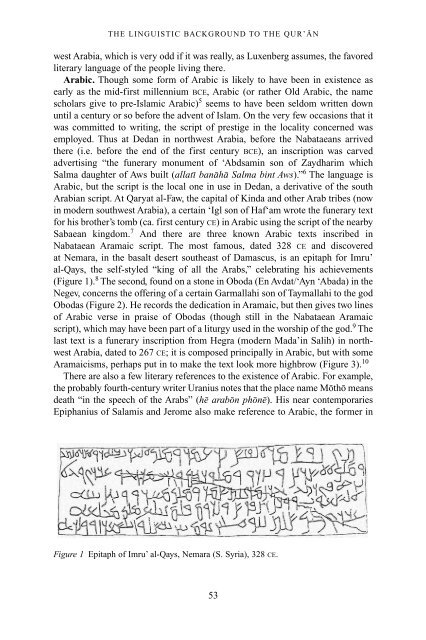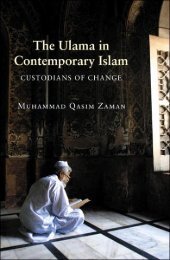The Qur'an in its historical context (pdf - Islam and Christian-Muslim ...
The Qur'an in its historical context (pdf - Islam and Christian-Muslim ...
The Qur'an in its historical context (pdf - Islam and Christian-Muslim ...
You also want an ePaper? Increase the reach of your titles
YUMPU automatically turns print PDFs into web optimized ePapers that Google loves.
THE LINGUISTIC BACKGROUND TO THE QUR’AN<br />
west Arabia, which is very odd if it was really, as Luxenberg assumes, the favored<br />
literary language of the people liv<strong>in</strong>g there.<br />
Arabic. Though some form of Arabic is likely to have been <strong>in</strong> existence as<br />
early as the mid-first millennium BCE, Arabic (or rather Old Arabic, the name<br />
scholars give to pre-<strong>Islam</strong>ic Arabic) 5 seems to have been seldom written down<br />
until a century or so before the advent of <strong>Islam</strong>. On the very few occasions that it<br />
was committed to writ<strong>in</strong>g, the script of prestige <strong>in</strong> the locality concerned was<br />
employed. Thus at Dedan <strong>in</strong> northwest Arabia, before the Nabataeans arrived<br />
there (i.e. before the end of the first century BCE), an <strong>in</strong>scription was carved<br />
advertis<strong>in</strong>g “the funerary monument of ‘Abdsam<strong>in</strong> son of Zaydharim which<br />
Salma daughter of Aws built (allati banaha Salma b<strong>in</strong>t Aws).” 6 <strong>The</strong> language is<br />
Arabic, but the script is the local one <strong>in</strong> use <strong>in</strong> Dedan, a derivative of the south<br />
Arabian script. At Qaryat al-Faw, the capital of K<strong>in</strong>da <strong>and</strong> other Arab tribes (now<br />
<strong>in</strong> modern southwest Arabia), a certa<strong>in</strong> ‘Igl son of Haf‘am wrote the funerary text<br />
for his brother’s tomb (ca. first century CE) <strong>in</strong> Arabic us<strong>in</strong>g the script of the nearby<br />
Sabaean k<strong>in</strong>gdom. 7 And there are three known Arabic texts <strong>in</strong>scribed <strong>in</strong><br />
Nabataean Aramaic script. <strong>The</strong> most famous, dated 328 CE <strong>and</strong> discovered<br />
at Nemara, <strong>in</strong> the basalt desert southeast of Damascus, is an epitaph for Imru’<br />
al-Qays, the self-styled “k<strong>in</strong>g of all the Arabs,” celebrat<strong>in</strong>g his achievements<br />
(Figure 1). 8 <strong>The</strong> second, found on a stone <strong>in</strong> Oboda (En Avdat/‘Ayn ‘Abada) <strong>in</strong> the<br />
Negev, concerns the offer<strong>in</strong>g of a certa<strong>in</strong> Garmallahi son of Taymallahi to the god<br />
Obodas (Figure 2). He records the dedication <strong>in</strong> Aramaic, but then gives two l<strong>in</strong>es<br />
of Arabic verse <strong>in</strong> praise of Obodas (though still <strong>in</strong> the Nabataean Aramaic<br />
script), which may have been part of a liturgy used <strong>in</strong> the worship of the god. 9 <strong>The</strong><br />
last text is a funerary <strong>in</strong>scription from Hegra (modern Mada’<strong>in</strong> Salih) <strong>in</strong> northwest<br />
Arabia, dated to 267 CE; it is composed pr<strong>in</strong>cipally <strong>in</strong> Arabic, but with some<br />
Aramaicisms, perhaps put <strong>in</strong> to make the text look more highbrow (Figure 3). 10<br />
<strong>The</strong>re are also a few literary references to the existence of Arabic. For example,<br />
the probably fourth-century writer Uranius notes that the place name Motho means<br />
death “<strong>in</strong> the speech of the Arabs” (he arabon phone). His near contemporaries<br />
Epiphanius of Salamis <strong>and</strong> Jerome also make reference to Arabic, the former <strong>in</strong><br />
Figure 1 Epitaph of Imru’ al-Qays, Nemara (S. Syria), 328 CE.<br />
53



